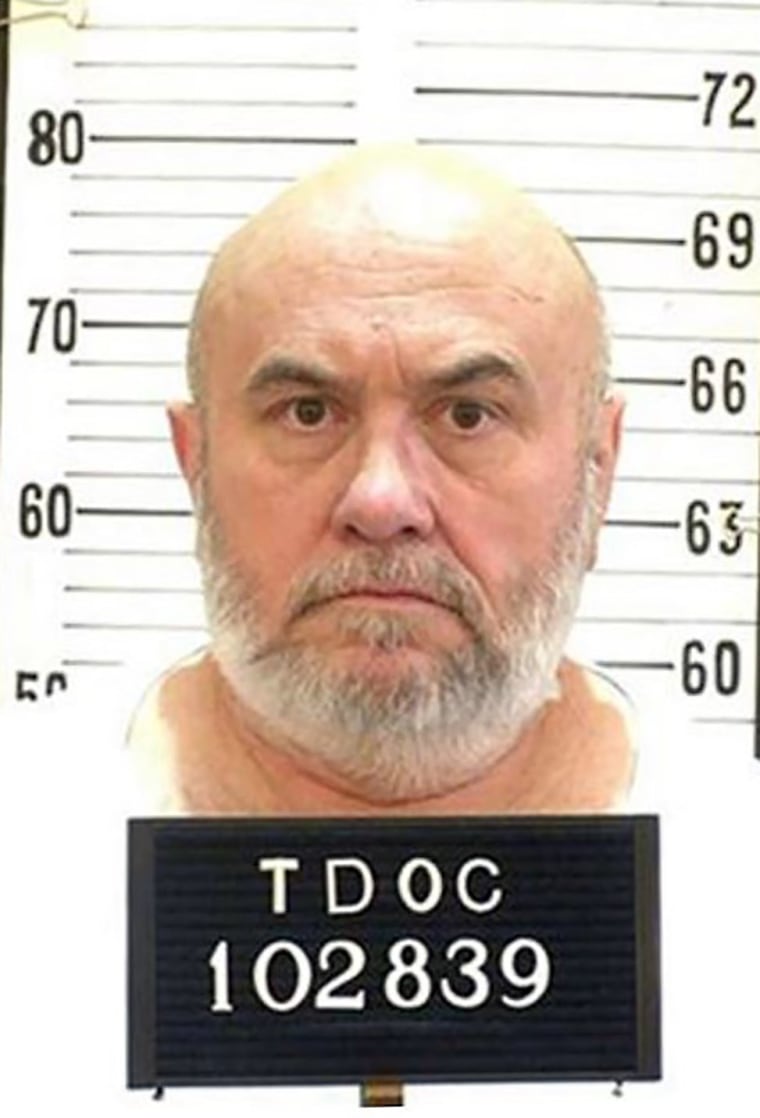A double-murderer was put to death in the electric chair on Thursday night, as the state of Tennessee made good on the killer’s grim request to perish by electrocution and not lethal injection.
Edmund Zagorski, 63, was pronounced dead at 7:26 p.m. CT (8:26 p.m. ET) at Riverbend Maximum Security Institution in Nashville, a spokeswoman for the Tennessee Department of Corrections said at a press conference.
He was the nation's first electric chair death in five years.
A slew of late appeals by Zagorski’s legal team — claiming previous ineffective counsel and that the electric chair was cruel and unusual punishment — were turned aside by a federal appears court and the U.S. Supreme Court.
Zagorski's final words were "Let's Rock," according to media witnesses to the execution, including a reporter with NBC affiliate WSMV. Witnesses said at a press conference following the electrocution that Zagorski was grinning at times but grimaced just before officials fired up the electricity.
He had dined on a final meal of pickled pig knuckles and tails, according to prison officials.
While Tennessee normally puts inmates to death with lethal injection, Zagorski wants to die in the electric chair, claiming that 1,750 volts will be less painful than receiving a deadly cocktail of IV drugs.
State law allows condemned prisoners, who committed their crimes before January 1999, to opt for electrocution.

Zagorski, who murdered two men in 1983 in a drug deal gone wrong, had been set to die by lethal injection on Oct. 11 and the killer opted for electrocution. State authorities originally denied Zagorski’s preference for electrocution, saying his request came too late.
But hours before the scheduled execution, Gov. Bill Haslam ordered a 10-day delay so the state could prepare the electric chair for Zagroski’s use.
The last time Tennessee used the chair was in 2007 when the state executed 45-year-old Daryl Keith Holton, a Gulf War veteran who murdered his four children.
Gov. Haslam said this week he’s confident the electric chair will function properly on Thursday night.
“I have a great deal of confidence in our Department of Correction folks,” he said. “We’ve spoken with them regularly and they’ve assured us (the chair is ready).”
Zagorski was moved to a special holding cell near the death chamber on Tuesday morning, ahead of Thursday night’s execution.
That’s when an execution team sat Zagorski in the electric chair and wrap sponges soaked in saltwater around his ankles and head, to better conduct electricity.
In legal filings, Zagorki said death at the end of a syringe probably lasts “10-18 minutes... in utter terror and agony." He claimed electrocution would be a shorter, less painful experience.
Zagorski was sentenced to death for the 1983 slayings of John Dotson and Jimmy Porter — two 35-year-old men who were planning to buy 100 pounds of marijuana from him.
Zagorski was the 1,485th execution carried out in the United States since capital punishment was re-started in 1976, according to the Death Penalty Information Center in Washington D.C.
But he was only the eighth death penalty carried out in the Volunteer State since 1976, although there has already been one this year. William “Billy” Ray Irick was put to death on Aug. 9 for the 1985 rape and murder of a 7-year-old girl.
Zagorski was the 159th person put to death in the electric chair in the United States since 1976. But the most recent electrocution was in 2013, when Virginia executed Robert Charles Gleason Jr., who murdered two fellow inmates.